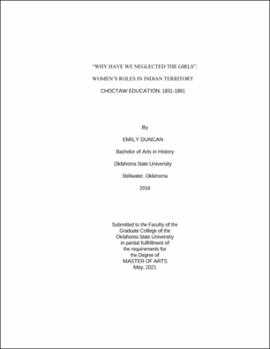| dc.contributor.advisor | Arata, Laura | |
| dc.contributor.author | Duncan, Emily | |
| dc.date.accessioned | 2021-09-23T19:51:49Z | |
| dc.date.available | 2021-09-23T19:51:49Z | |
| dc.date.issued | 2021-05 | |
| dc.identifier.uri | https://hdl.handle.net/11244/330861 | |
| dc.description.abstract | After the forceful removal of the Choctaw to Indian Territory in 1831, they quickly established schools for their children. They believed emphasizing female education simultaneously preserved Choctaw culture and encouraged the United States' continued recognition of their sovereignty. Thus, the school system became a meeting point for Choctaw, white, and Black women who supported female education efforts. | |
| dc.description.abstract | These schools were not the first attempt at western-style education for the Choctaw. After attempting to utilize mission schools in their Southeastern homelands as well as the boy's Choctaw Academy in Kentucky, the Nation built a school system they controlled. Utilizing Choctaw women as teachers and administrators at many of their public schools, the high demand resulted in external support. Accommodating the influx of students, Choctaws contracted white American teachers and utilized Black enslaved labor to assist in running the schools. A system emerged where the Choctaw tended to run their Sabbath and Neighborhood Schools while whites dominated the academy boarding school system with the assistance of slave labor. Of course, the Choctaw girls who attended these schools also played important roles learning and melding Euro-American education and customs with their own in order to prepare themselves for future contact with colonial powers around them. | |
| dc.description.abstract | This work balances the field in numerous ways. Indian Boarding Schools post-Civil War receive wide attention, yet there is little literature on them between the 1830s and 1860s. In addition to studying this earlier period, the work highlights the roles of Black women within schools alongside white and Choctaw women's teaching. Focusing on Choctaw agency in the future of their daughters and Nation, this work explores women's crucial roles in laying the foundations of Choctaw public education. | |
| dc.format | application/pdf | |
| dc.language | en_US | |
| dc.rights | Copyright is held by the author who has granted the Oklahoma State University Library the non-exclusive right to share this material in its institutional repository. Contact Digital Library Services at lib-dls@okstate.edu or 405-744-9161 for the permission policy on the use, reproduction or distribution of this material. | |
| dc.title | "Why have we neglected the girls" : Women's roles in Indian Territory Choctaw education, 1831-1861 | |
| dc.contributor.committeeMember | Boles, Richard | |
| dc.contributor.committeeMember | Murray, Jennifer | |
| osu.filename | Duncan_okstate_0664M_17094.pdf | |
| osu.accesstype | Open Access | |
| dc.type.genre | Thesis | |
| dc.type.material | Text | |
| dc.subject.keywords | choctaw | |
| dc.subject.keywords | education | |
| dc.subject.keywords | missionary | |
| dc.subject.keywords | oklahoma | |
| dc.subject.keywords | school | |
| dc.subject.keywords | women | |
| thesis.degree.discipline | History | |
| thesis.degree.grantor | Oklahoma State University | |
